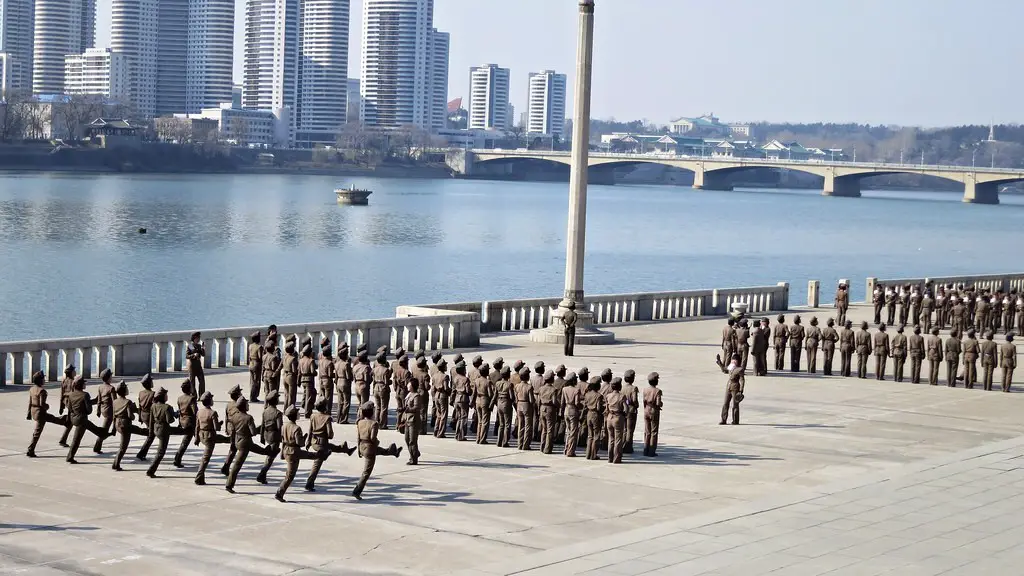Background
The US has a long list of grievances against North Korea. North Korea is known for its nuclear weapons program, gross violations of human rights, persistent cyber-attacks, repeated violations of United Nations Security Council resolutions, and its use of intimidation and aggression against its neighbors. In the past few years, the US has made numerous attempts to engage diplomatically with North Korea in the hopes of curbing its nuclear ambitions, but those efforts have been unsuccessful.
The Current Situation
The current situation is precarious. North Korea has continued to test and expand its nuclear weapons capabilities, while refusing to commit to any kind of negotiated agreement. In response, the US and its allies have been increasing their military presence in the region and imposing various sanctions. President Trump has made it clear that the US is willing to use force if necessary to protect its allies and interests in the region.
International Perspective
The international community is divided over the question of whether the US should take military action against North Korea. Many countries have expressed their opposition to the prospect of war, fearing that it could lead to a widespread conflict, with catastrophic consequences. China, which is North Korea’s closest ally, has urged restraint and called for a diplomatic solution to the crisis.
US Perspective
The US has been unwilling to rule out the possibility of military action against North Korea. US officials have warned that North Korea’s actions could lead to a “massive military response” if provoked. However, the US is also aware that any attack could trigger a devastating retaliatory strike, which could cause loss of life on a massive scale.
Analysis
Given the current situation, it is highly unlikely that the US will launch a preemptive strike against North Korea. The risks involved are too great, and a successful attack is far from certain. It is also unclear whether the US has the capacity to launch and sustain an effective attack. A more likely scenario is that the US will continue to use economic and diplomatic pressure in an attempt to contain North Korea’s nuclear ambitions and other hostile activities.
Experts’ Opinion
Experts agree that the US is unlikely to launch a military attack on North Korea, but they also caution that the current situation is volatile and could quickly deteriorate. “The US is not likely to launch a preemptive strike against North Korea unless it determines that North Korea is about to launch an attack against the US or its allies,” said John Hamre, president of the Center for Strategic and International Studies. “However, if the situation escalates, the US will have to make a decision about whether or not to use military force,” he added.
Domestic Support
The reality is that the US is unlikely to take military action against North Korea without extensive domestic and international support. A recent Gallup poll found that a majority of Americans oppose the use of military force against North Korea, regardless of whether or not North Korea initiates hostilities. This suggests that the US will be reluctant to take action without first building significant public and political support.
Analysis of International Assistance
It is clear that international cooperation and assistance is necessary if any kind of meaningful action is to be taken against North Korea. China, South Korea, and Russia all have a vested interest in ensuring that the current crisis is resolved peacefully. They each have considerable diplomatic and economic leverage which could be used to encourage North Korea to return to the negotiating table.
Key Players in Negotiations
The US and China are the key players in any negotiations with North Korea. Both countries have the ability to shape the outcome of any talks, and it is likely that the US will depend heavily on China in order to broker a diplomatic solution. China has traditionally been a strong ally of North Korea and has significant economic ties with the regime.
Role of UN Security Council
The UN Security Council is also key to resolving the crisis. In the past, the Security Council has imposed sanctions against North Korea but has struggled to enforce them. However, the Security Council is the only organization with the international legitimacy to take action against North Korea. It is therefore essential that the Security Council remain engaged in the process and continue to demand that North Korea comply with its obligations.
Impact of Sanctions
The impact of international sanctions on North Korea is complex. On the one hand, sanctions have resulted in significant economic hardship for the regime, which has weakened its military capabilities. However, on the other hand, economic deprivation can also lead to increased militarization, as the regime attempts to ensure its survival by acquiring more powerful weapons. As such, the effectiveness of sanctions in curbing North Korea’s nuclear ambitions is highly debatable.
International Support For North Korea
China is the most significant international supporter of North Korea. It has traditionally been the main supplier of aid and investment to the regime, and continues to shield North Korea from severe international sanctions. Russia, while less supportive of North Korea than China, has also provided assistance to the regime. North Korea is also a signatory of the Non-Proliferation Treaty, and while it has been repeatedly in breach of the treaty, its membership implies an obligation to refrain from any hostile action against other countries.
Continued Diplomacy
Given the complexity of the situation and the absence of any feasible military solution, it is likely that the US will have to continue to pursue diplomatic means for resolving the crisis. A negotiated solution will require participation from all sides, and it is essential that the US and its allies remain committed to engaging in dialogue with North Korea and building relationships of mutual trust.



